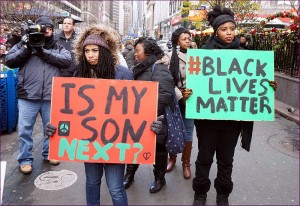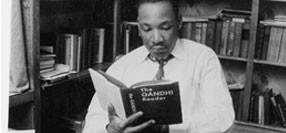The following post was contributed by Adam Nolan, a participant in our current Certificate in Nonviolence Studies course.
I have a few thoughts and things I have been grappling with for some time.
It is striking to me that with each killing of an unarmed black man by police there is a renewed sense of shock (as if this is something new) and inability to understand why the African American community takes to the streets (mostly nonviolently, although this isn’t covered). The media has more often than not been complicit in attempting to demonize the black youth killed and in downplaying the legitimacy of community outrage. It is my opinion that lack of historical understanding, in addition to the explicit and implicit messages we receive in the media and from politicians, make it difficult for many people to formulate a more accurate and peaceful attitude towards issues of race in America.
 It is my belief that American society and institutions are structured and rooted in white supremacy dating back to colonialism, retained with the nation’s founding, and still alive today. The black community have endured and overcome extreme violence with slavery, then lynchings, segregation and discrimination, de-industrialization, now mass incarceration and with that legal discrimination in housing, jobs, voting, etc (see Michelle Alexander’s The New Jim Crow). I have studied a lot of African American history (which is largely excluded from American history curriculum), but I know that only scratches the surface of understanding what the black community deals with on a daily basis and throughout history. In his 1903 The Souls of Black Folk, W.E.B. Du Bois describes the African American experience as a sort of “double-consciousness” in that as black folk are trying to live their own lives as they see fit they are also always having to be conscious of how their actions/behaviors/being are being observed by others (white folk). One major problem I see is that we are missing a true American and World history representative of all peoples, and to me it is going to be difficult for us to move forward if we do not acknowledge the history, as ugly as it is, and then move toward reconciliation and New Story.
It is my belief that American society and institutions are structured and rooted in white supremacy dating back to colonialism, retained with the nation’s founding, and still alive today. The black community have endured and overcome extreme violence with slavery, then lynchings, segregation and discrimination, de-industrialization, now mass incarceration and with that legal discrimination in housing, jobs, voting, etc (see Michelle Alexander’s The New Jim Crow). I have studied a lot of African American history (which is largely excluded from American history curriculum), but I know that only scratches the surface of understanding what the black community deals with on a daily basis and throughout history. In his 1903 The Souls of Black Folk, W.E.B. Du Bois describes the African American experience as a sort of “double-consciousness” in that as black folk are trying to live their own lives as they see fit they are also always having to be conscious of how their actions/behaviors/being are being observed by others (white folk). One major problem I see is that we are missing a true American and World history representative of all peoples, and to me it is going to be difficult for us to move forward if we do not acknowledge the history, as ugly as it is, and then move toward reconciliation and New Story.
 If more Americans knew history, especially the African American experience, society would have a much different perspective on the extreme violence being witnessed. I recognize my white privilege. I was raised in a working class family, not a great deal of economic opportunity, but in a loving, relatively nonviolent environment. In my personal story, the fact that I am here taking a course on nonviolence is demonstrative of positive environments and opportunities that I have had throughout life. I think that we can all agree that far too many of the world’s inhabitants do not have this comfort and opportunity. I mean, if I was born into, grew up in, and experienced daily an atmosphere of extreme poverty and violence, what would I know or think of nonviolence as a way of changing my experience?
If more Americans knew history, especially the African American experience, society would have a much different perspective on the extreme violence being witnessed. I recognize my white privilege. I was raised in a working class family, not a great deal of economic opportunity, but in a loving, relatively nonviolent environment. In my personal story, the fact that I am here taking a course on nonviolence is demonstrative of positive environments and opportunities that I have had throughout life. I think that we can all agree that far too many of the world’s inhabitants do not have this comfort and opportunity. I mean, if I was born into, grew up in, and experienced daily an atmosphere of extreme poverty and violence, what would I know or think of nonviolence as a way of changing my experience?
I guess what I am getting at is that I and we (as a society) really need to make an effort to
understand where each of us are coming from in life and what our experiences are. I have had conversations with black friends, and while they know about potentials as seen through MLK and nonviolence in the civil rights movement, they were not willing to let go of a violent option if necessary. I am reminded of the Black Power Movement and the Black Panther Party that advocated for self-defense against police brutality and used violent revolutionary rhetoric to condemn the U.S. Government system and institutions that did not represent the black community. I have found it difficult and oftentimes frustrating to try and push the case for nonviolence with these friends, and understandably so considering the violent oppression that their community has faced. I can say that conversations with many white brothers and sisters have been far and away more difficult and infuriating. I recognize that in these situations, that one, I was not equipped with an adequate framework of nonviolence, and two, did not fully take into account historic and current experiences in America. Insights from this course and the participants are helping to build this framework and the patience necessary.
I believe that we all have the capacity to adopt a life of nonviolence because the force is within us all. I also believe that as human beings, we all have it built into us a yearning for peace, community, and a better, more just world. I think one of the best things that I can do moving forward is just listen and do my best to understand the experiences that other people face and what they are up against. With this, I need to work on patience, compassion, and grounding my self in a place of love.








